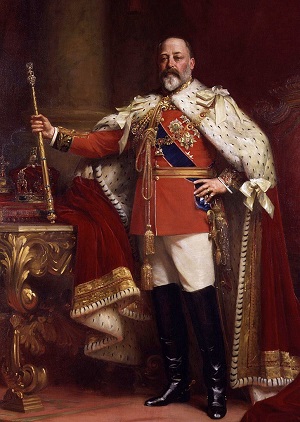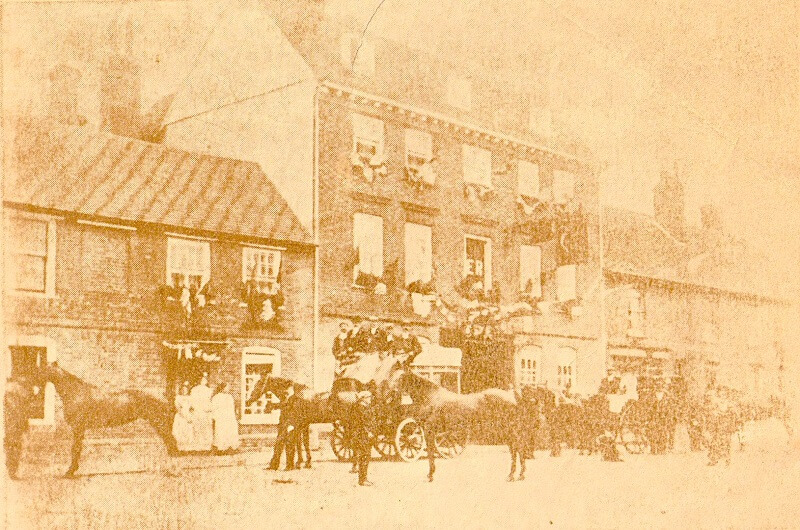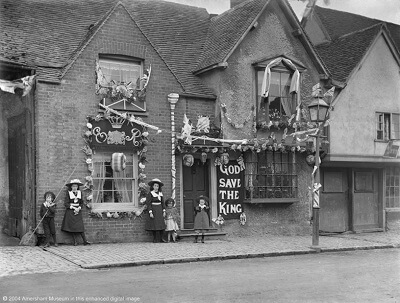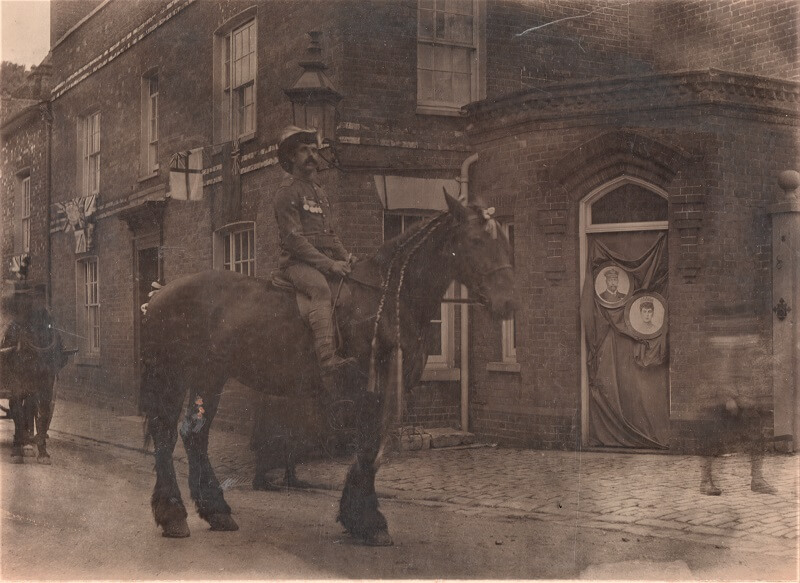EDWARD VII Coronation

Following the death of Queen Victoria on 22 January 1901, her eldest son Edward prepared for his accession at the age of 59. As the longest serving Prince of Wales, there was a national mood of rising excitement. The success of public involvement at the previous coronation was acknowledged coupled with the desire to showcase British achievement to the world. So where to start? A lot had changed in the 64 years since the last coronation.
Edward was a popular figure amongst the British public. He was well-travelled, related to most of the ruling heads in Europe. Victoria did not involve him in constitutional matters for much of her reign but his affable manner made him popular and he pioneered royalty’s now familiar role in public appearance. He and his wife, Alexandra established Marlborough House as their London residence and enjoyed a lavish social lifestyle. Although he was only king for 9 years the period became known as the Edwardian era. He was well -known for his indulgent lifestyle and womanising but he also had a gift for relating to people and he broadened the range of people royalty would meet. He reinstated the monarch’s role in the State Opening of Parliament, helped found the Royal College of Music and introduced the Order of Merit. He was keen on horse-racing and steeple chasing. He was regarded as an arbiter of men’s fashion, popularising a number of fashion styles and is also credited with introducing roast beef served with horseradish sauce and Yorkshire pudding which became the nation’s staple for Sunday lunch.
SO HOW DID AMERSHAM RESPOND?
Edward was proclaimed king on 12 February 1901 with the pupils at St Mary’s School given a half day holiday in celebration.

Across the land, Coronation committees, local representatives of the great and the good, mostly male, were quickly established. So news of a Coronation arranged for 26 June 1902 was received with great excitement in Amersham .
In Amersham a public meeting was held on Thursday 29 May 1902 attended by over 60 people.
Read how the suggestion of a beer fountain in the High Street was suggested – but then discarded! Children and old people were the immediate focus of attention by these committees and banqueting and the distribution of mugs or medals were the preferred route. Should the festivities be funded by public subscription or by a levy on the local rate? Should the event be marked by transitory or permanent memorial – drinking fountains and public baths being suggested? Click here.
The Board of Guardians met to discuss the matter for the needy. Mr. Robinson moved that the inmates should be liberally entertained in connection with the King’s Coronation, and that the children should also have mug or a medal to commemorate the event.—Mr. Jenkins seconded, and the motion was agreed to.—A resolution, granting the out-door poor extra relief during Coronation week,(adults Is., children 6d.’ was adopted 8 votes to 3. – the minority considering that the out-door poor would be included in the general festivities.
Neighbouring villages joined in. The Bucks Herald reported for Coleshill ‘The Coronation Festivities here, so far as arranged at the beginning of the week, were to comprise the roasting of one or two fat sheep, according to the amount of funds subscribed, on Coleshill Common, on Thursday, be afterwards distributed to all comers, and a bonfire on the Common at night. On Friday, tea for all children under the age of 16 years. Sports for all people, including dancing.” The Chalfont St. Giles Band was to be attendance on Friday.
ALAS IT WAS NOT TO BE
As reported in the Bucks Examiner, a note hastily inserted in our issue of last week conveyed the astounding information that,
“owing to the dangerous illness of the King, the Coronation ceremonies had, at the eleventh hour, been indefinitely postponed. The first intimation was given at 11.15 a.m. on June 24 in the form of a bulletin posted at Buckingham Palace,……….
Coronation Day, in point of weather, would have been perfect for the great pageant. As it was, sightseers moved listlessly about the route of procession, taking note of the neglected decorations and imagining regretfully all that the day might have been. Here and there seat-holders, probably from the country, actually occupied their places, and sat watching the traffic. In strict law, no doubt these enthusiasts have forfeited all claim to a return of their money.”
The news was not well received and in some parts of the country, there were threats of riots. Locally it was reported: ” Great consternation was caused in Amersham when it became known that the King was dangerously ill. When the first telegram arrived announcing the sad fact it was hardly credited, but when it was confirmed expressions of sympathy were heard upon all hands. The Coronation Committee met in the evening (Tuesday) and adjourned until Wednesday morning, and at that meeting it was decided to postpone the festivities indefinitely.’ •
The correspondent for Coleshill wrote” Although heartily sympathising with the King in his sudden and dangerous illness the festivity preparations have been carried too far to be abandoned, as sheep have been killed ready for roasting and other preparations completed. The festivities will, therefore, be carried out, though not upon so large a scale as at first intended.” A telegram received between eleven and twelve o’clock stated that the following bulletin had been posted at Buckingham Palace, signed by the physicians :—” His Majesty had a better night and has had some refreshing sleep. He has improved in all respects. His condition is quite favourable. The state of the wound is also satisfactory.”
“Owing to the postponement of the Coronation festivities for Amersham which is reported to have caused great dissatisfaction Mr. H. A. Death and Mr. F. Keen, put on a free tea to upwards of forty children in Harbour Field, Several games were afterwards freelv indulged in. and the little faces were greatlv brightened by the agreeab!e change. A good scramble for sweets brought a very enjoyable day to a close.”
The Board of Guardians also met and it was reported that
‘Dr. A. H. Turner, of Beaconsfield. visited the House on the 29th July, and gave each smoker in the Hospital packet of tobacco. —The Master further reported that the inmates had their Coronation dinner, consisting of cold roast beef, roast legs of mutton, and boiled hams, served up with pickles and new potatoes, also roley-poley pudding, blanc-mange, custards, and stewed fruit. The dinner was very much enjoyed by all. and they wished to thank the Board for it. —Mr. Darlington: Our Coronation Committee also gave them medals.—The Master: Yes, that was omission of mine.—Mr. Summers also reported the gift of a large basket of buns for the inmates from Mr. J. Whiteside, of Amersham and gifts of flowers for the sick wards from the Lower Baptist Chapel, Amersham.’
SUCCESSFUL OUTCOME

King Edward had been determined that his Coronation should go ahead and after an excellent recovery from surgery, it was duly arranged for 9 August 1902. The pupils at St Mary’s received an additional week’s holiday, added to their usual four week summer break.
The Bucks Herald reported
“The Coronation festivities were held here on Saturday, August 9, when the elaborate programme drawn up by the committee was successfully carried out. At early dawn the church bells were rung and the inhabitants roused by the merry peals. During the morning the streets were patrolled by numerous sightseers to witness the decorations, which were extremely effective, several residence being very prettily adorned, whilst the main street was crossed in numerous places by lines of flags. Among the best decorated houses were the Griffin Hotel, which was covered with bunting. Mrs Gomm’s in the High Street, presented quite a picture, and Mrs Clarke’s of Aspley House, was extremely pleasing, her decorations consisting wholly of natural flowers. Mr Redhead’s, Mr Fuller’s, and Mr E E King’s shops were also tastefully treated, while Dr J C Gardner’s was brilliantly illuminated at night. At 11 am, a service was held in the Parish Church, a large congregation being present. The Rev – Ferry gave a suitable address. At 1pm 2s, each was given to exactly 100 applicants, 65 years of age and upwards, at the Town Hall. In the afternoon, in Barn Meadow, racing and sports of all descriptions were arranged for the children, the adults having their turn in the evening. The residents of the town and district assembled in large numbers, and some good sport was witnessed. Among those present were the Squire, Mr T W T Drake, Mrs Drake, and family, Shardeloes also Captain and Miss Drake, Little Shardeloes, also the Misses Drake (nieces), Mr G M H and Mrs Weller, Dr Gardner, Mr Rushforth, Mr & Mrs Fuller and the Misses Fuller, Mrs Read and family etc. At 4 o’clock all the school children in the parish were provided with tea in the National Schools. Mr Whitside being the caterer. The youngsters were looked after by young ladies of the town who volunteered their help. After the tea each child was presented with a Coronation medal by Mrs Drake. The sports in the evening caused great amusement to the crowd of spectators which had by this time greatly increased in number. A sharp shower of rain caused dispersal for a short time, but afterwards the sports were concluded, during the afternoon and evening the Amersham Brass Band played selections which materially assisted to enliven the proceedings. “
Other villages joined in. The Amersham Band also appeared at the Penn Street Parish Tea on 15 August.
A successful parish tea was held in the grounds of Penn Street Vicarage on Friday, August 15th. About 150 parishioners sat down to tea together, the numbers being increased afterwards by late arrivals. The Amersham Band was in attendance, and played an excellent selection of music. Much amusement was caused during the evening by a man’s hat-trimming competition, and a washing competition, also for men, while the ladies tried their skill in a nail competition, seeing who could hammer the greatest number of nails into a piece of wood in a given time. Dancing and games were entered into with much heartiness on the lawn, the fine weather adding greatly to the enjoyment. In the course of the proceedings the Vicar made a brief speech, expressing the great pleasure it gave to Mrs Browning and himself to see so many present, and alluding to events of interest that had happened in the parish since last year’s parish tea –the restoration of the Parish Church, the visit of his Majesty King Edward, the services of intercession, and subsequently of thanksgiving for the King’s recovery. After thanking the numerous helpers, and those who had taken tables and poured out tea, he concluded by calling for the National Anthem, the singing of which was followed by cheers for the King and Queen. Later on Mr and Mrs Browning were heartily thanked for their welcome, and cheers were given for them and for those who helped them.

Sources
British Newspaper Archive
Wikipedia
The Shortest History of the Crown Stephen Bates
Images
Amersham Museum
Bucks Archive
Martin Pounce.
St Mary’s School
Amersham Band

